Kushal Chawla
Lessons from the Field: An Adaptable Lifecycle Approach to Applied Dialogue Summarization
Jan 13, 2026Abstract:Summarization of multi-party dialogues is a critical capability in industry, enhancing knowledge transfer and operational effectiveness across many domains. However, automatically generating high-quality summaries is challenging, as the ideal summary must satisfy a set of complex, multi-faceted requirements. While summarization has received immense attention in research, prior work has primarily utilized static datasets and benchmarks, a condition rare in practical scenarios where requirements inevitably evolve. In this work, we present an industry case study on developing an agentic system to summarize multi-party interactions. We share practical insights spanning the full development lifecycle to guide practitioners in building reliable, adaptable summarization systems, as well as to inform future research, covering: 1) robust methods for evaluation despite evolving requirements and task subjectivity, 2) component-wise optimization enabled by the task decomposition inherent in an agentic architecture, 3) the impact of upstream data bottlenecks, and 4) the realities of vendor lock-in due to the poor transferability of LLM prompts.
FB-RAG: Improving RAG with Forward and Backward Lookup
May 22, 2025Abstract:The performance of Retrieval Augmented Generation (RAG) systems relies heavily on the retriever quality and the size of the retrieved context. A large enough context ensures that the relevant information is present in the input context for the LLM, but also incorporates irrelevant content that has been shown to confuse the models. On the other hand, a smaller context reduces the irrelevant information, but it often comes at the risk of losing important information necessary to answer the input question. This duality is especially challenging to manage for complex queries that contain little information to retrieve the relevant chunks from the full context. To address this, we present a novel framework, called FB-RAG, which enhances the RAG pipeline by relying on a combination of backward lookup (overlap with the query) and forward lookup (overlap with candidate reasons and answers) to retrieve specific context chunks that are the most relevant for answering the input query. Our evaluations on 9 datasets from two leading benchmarks show that FB-RAG consistently outperforms RAG and Long Context baselines developed recently for these benchmarks. We further show that FB-RAG can improve performance while reducing latency. We perform qualitative analysis of the strengths and shortcomings of our approach, providing specific insights to guide future work.
KODIS: A Multicultural Dispute Resolution Dialogue Corpus
Apr 17, 2025
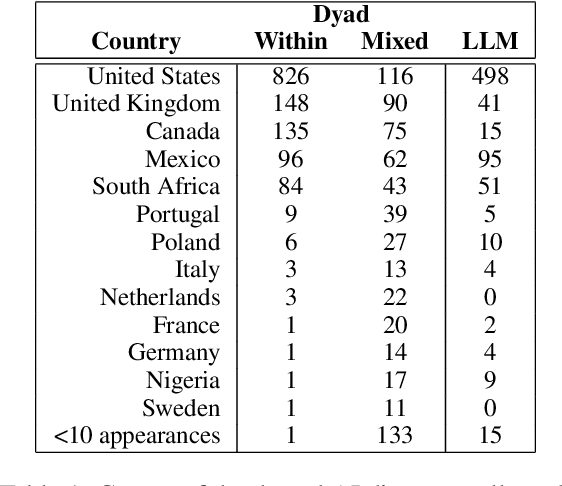

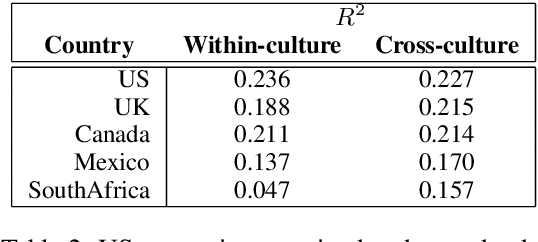
Abstract:We present KODIS, a dyadic dispute resolution corpus containing thousands of dialogues from over 75 countries. Motivated by a theoretical model of culture and conflict, participants engage in a typical customer service dispute designed by experts to evoke strong emotions and conflict. The corpus contains a rich set of dispositional, process, and outcome measures. The initial analysis supports theories of how anger expressions lead to escalatory spirals and highlights cultural differences in emotional expression. We make this corpus and data collection framework available to the community.
Are LLMs Effective Negotiators? Systematic Evaluation of the Multifaceted Capabilities of LLMs in Negotiation Dialogues
Feb 21, 2024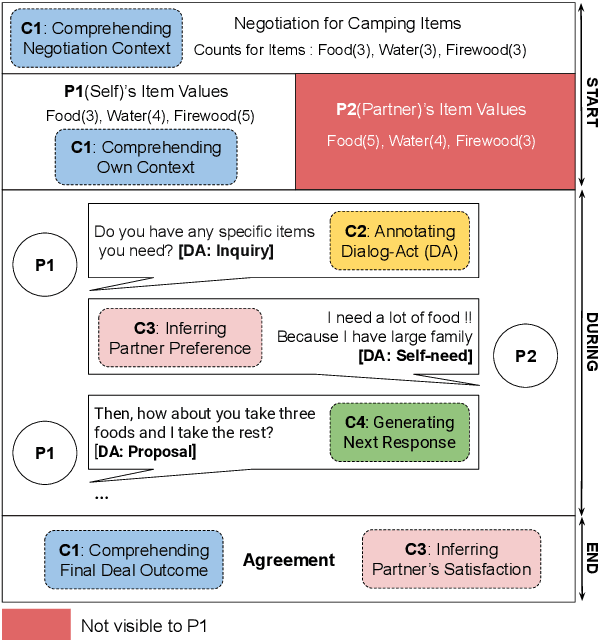
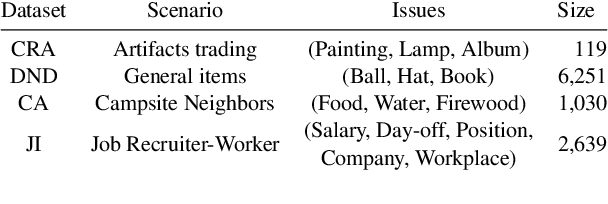
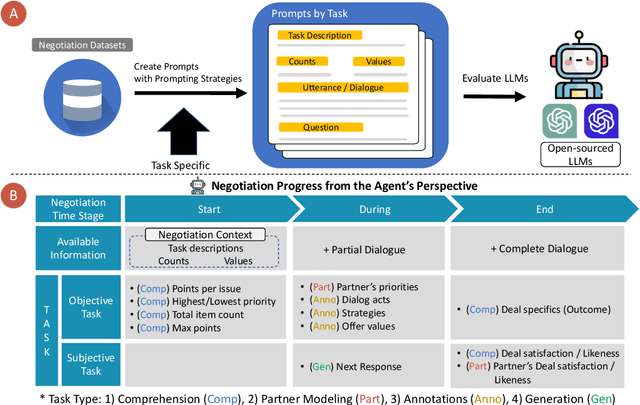

Abstract:A successful negotiation demands a deep comprehension of the conversation context, Theory-of-Mind (ToM) skills to infer the partner's motives, as well as strategic reasoning and effective communication, making it challenging for automated systems. Given the remarkable performance of LLMs across a variety of NLP tasks, in this work, we aim to understand how LLMs can advance different aspects of negotiation research, ranging from designing dialogue systems to providing pedagogical feedback and scaling up data collection practices. To this end, we devise a methodology to analyze the multifaceted capabilities of LLMs across diverse dialogue scenarios covering all the time stages of a typical negotiation interaction. Our analysis adds to the increasing evidence for the superiority of GPT-4 across various tasks while also providing insights into specific tasks that remain difficult for LLMs. For instance, the models correlate poorly with human players when making subjective assessments about the negotiation dialogues and often struggle to generate responses that are contextually appropriate as well as strategically advantageous.
Investigating Content Planning for Navigating Trade-offs in Knowledge-Grounded Dialogue
Feb 03, 2024Abstract:Knowledge-grounded dialogue generation is a challenging task because it requires satisfying two fundamental yet often competing constraints: being responsive in a manner that is specific to what the conversation partner has said while also being attributable to an underlying source document. In this work, we bring this trade-off between these two objectives (specificity and attribution) to light and ask the question: Can explicit content planning before the response generation help the model to address this challenge? To answer this question, we design a framework called PLEDGE, which allows us to experiment with various plan variables explored in prior work, supporting both metric-agnostic and metric-aware approaches. While content planning shows promise, our results on whether it can actually help to navigate this trade-off are mixed -- planning mechanisms that are metric-aware (use automatic metrics during training) are better at automatic evaluations but underperform in human judgment compared to metric-agnostic mechanisms. We discuss how this may be caused by over-fitting to automatic metrics and the need for future work to better calibrate these metrics towards human judgment. We hope the observations from our analysis will inform future work that aims to apply content planning in this context.
Be Selfish, But Wisely: Investigating the Impact of Agent Personality in Mixed-Motive Human-Agent Interactions
Oct 22, 2023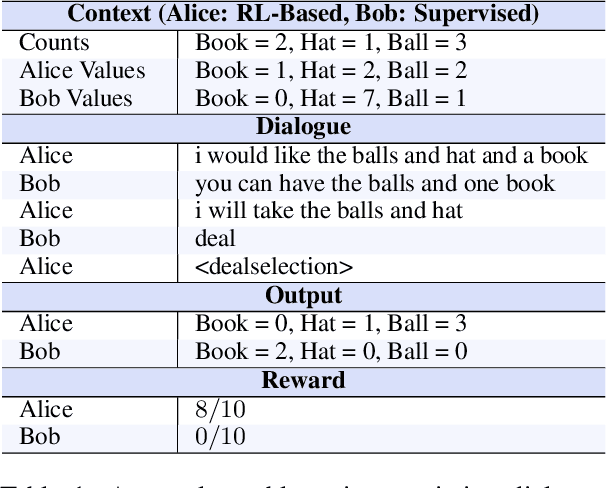
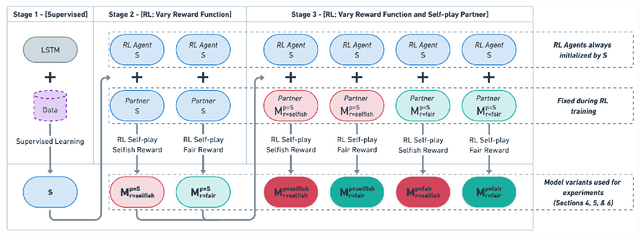

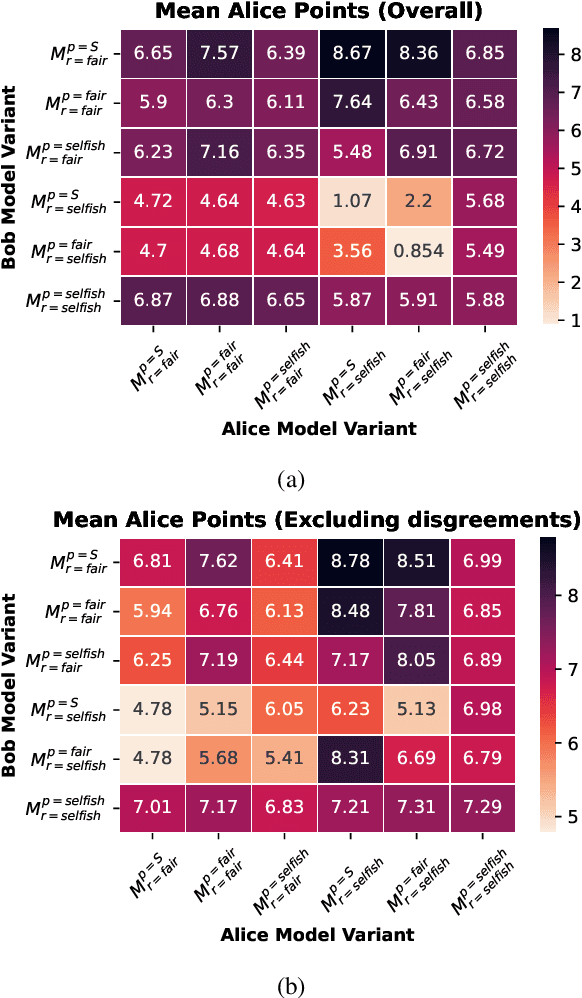
Abstract:A natural way to design a negotiation dialogue system is via self-play RL: train an agent that learns to maximize its performance by interacting with a simulated user that has been designed to imitate human-human dialogue data. Although this procedure has been adopted in prior work, we find that it results in a fundamentally flawed system that fails to learn the value of compromise in a negotiation, which can often lead to no agreements (i.e., the partner walking away without a deal), ultimately hurting the model's overall performance. We investigate this observation in the context of the DealOrNoDeal task, a multi-issue negotiation over books, hats, and balls. Grounded in negotiation theory from Economics, we modify the training procedure in two novel ways to design agents with diverse personalities and analyze their performance with human partners. We find that although both techniques show promise, a selfish agent, which maximizes its own performance while also avoiding walkaways, performs superior to other variants by implicitly learning to generate value for both itself and the negotiation partner. We discuss the implications of our findings for what it means to be a successful negotiation dialogue system and how these systems should be designed in the future.
Social Influence Dialogue Systems: A Scoping Survey of the Efforts Towards Influence Capabilities of Dialogue Systems
Oct 11, 2022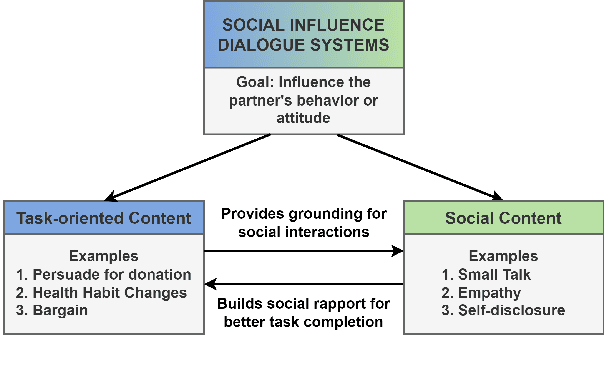
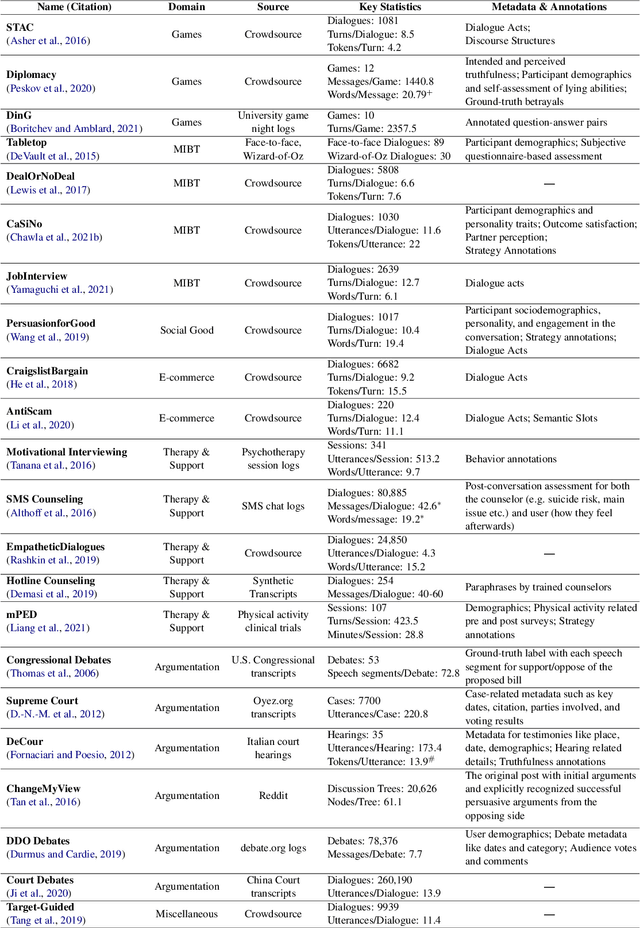
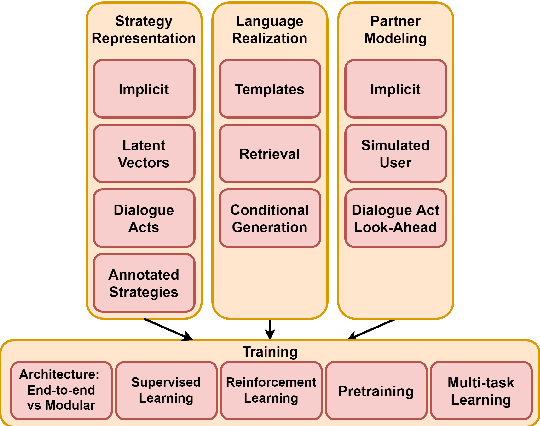
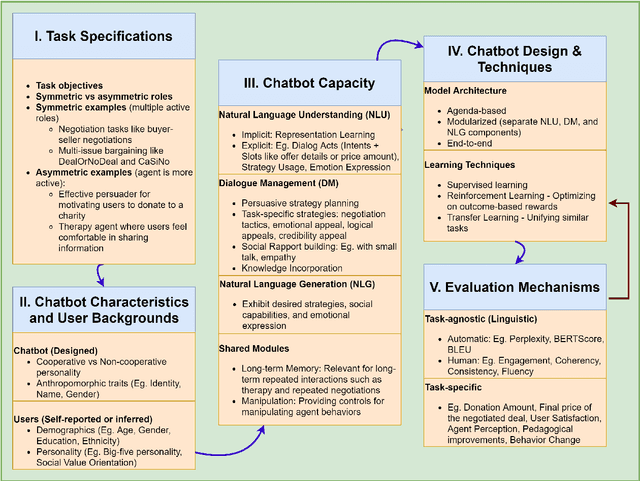
Abstract:Dialogue systems capable of social influence such as persuasion, negotiation, and therapy, are essential for extending the use of technology to numerous realistic scenarios. However, existing research primarily focuses on either task-oriented or open-domain scenarios, a categorization that has been inadequate for capturing influence skills systematically. There exists no formal definition or category for dialogue systems with these skills and data-driven efforts in this direction are highly limited. In this work, we formally define and introduce the category of \emph{social influence dialogue systems} that influence users' cognitive and emotional responses, leading to changes in thoughts, opinions, and behaviors through natural conversations. We present a survey of various tasks, datasets, and methods, compiling the progress across seven diverse domains. We discuss the commonalities and differences between the examined systems, identify limitations, and recommend future directions. This study serves as a comprehensive reference for social influence dialogue systems to inspire more dedicated research and discussion in this emerging area.
Opponent Modeling in Negotiation Dialogues by Related Data Adaptation
May 03, 2022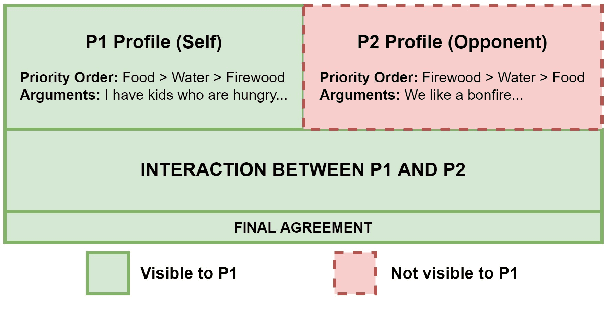
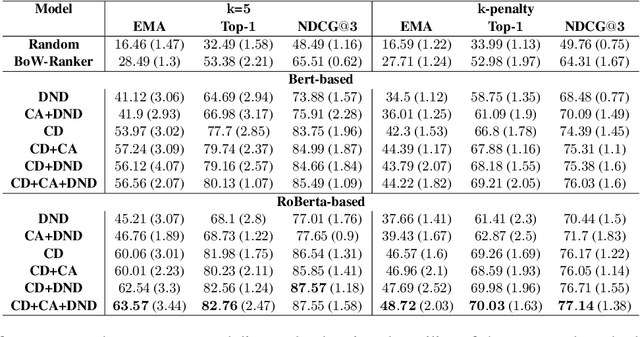
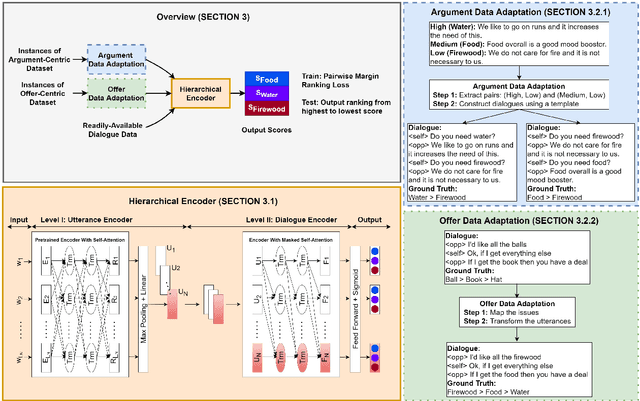
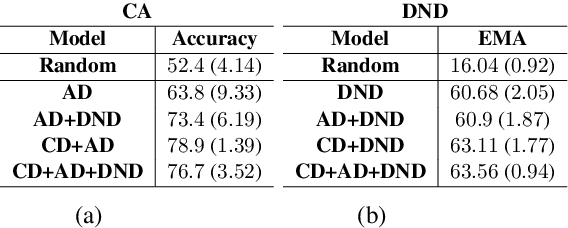
Abstract:Opponent modeling is the task of inferring another party's mental state within the context of social interactions. In a multi-issue negotiation, it involves inferring the relative importance that the opponent assigns to each issue under discussion, which is crucial for finding high-value deals. A practical model for this task needs to infer these priorities of the opponent on the fly based on partial dialogues as input, without needing additional annotations for training. In this work, we propose a ranker for identifying these priorities from negotiation dialogues. The model takes in a partial dialogue as input and predicts the priority order of the opponent. We further devise ways to adapt related data sources for this task to provide more explicit supervision for incorporating the opponent's preferences and offers, as a proxy to relying on granular utterance-level annotations. We show the utility of our proposed approach through extensive experiments based on two dialogue datasets. We find that the proposed data adaptations lead to strong performance in zero-shot and few-shot scenarios. Moreover, they allow the model to perform better than baselines while accessing fewer utterances from the opponent. We release our code to support future work in this direction.
Towards Emotion-Aware Agents For Negotiation Dialogues
Jul 28, 2021

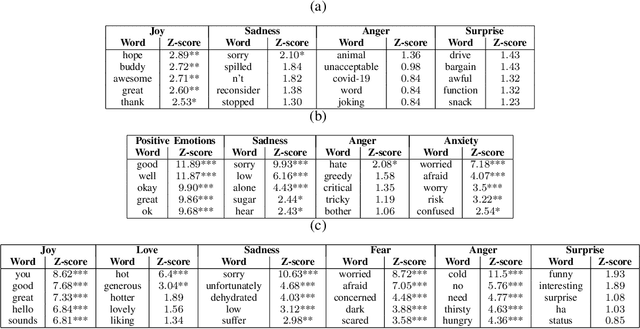
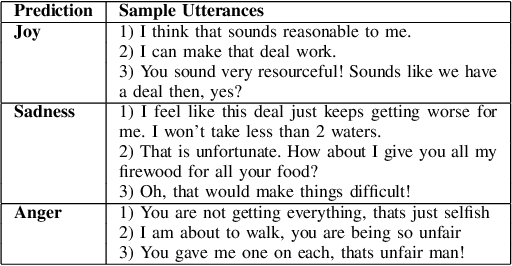
Abstract:Negotiation is a complex social interaction that encapsulates emotional encounters in human decision-making. Virtual agents that can negotiate with humans are useful in pedagogy and conversational AI. To advance the development of such agents, we explore the prediction of two important subjective goals in a negotiation - outcome satisfaction and partner perception. Specifically, we analyze the extent to which emotion attributes extracted from the negotiation help in the prediction, above and beyond the individual difference variables. We focus on a recent dataset in chat-based negotiations, grounded in a realistic camping scenario. We study three degrees of emotion dimensions - emoticons, lexical, and contextual by leveraging affective lexicons and a state-of-the-art deep learning architecture. Our insights will be helpful in designing adaptive negotiation agents that interact through realistic communication interfaces.
CaSiNo: A Corpus of Campsite Negotiation Dialogues for Automatic Negotiation Systems
Mar 29, 2021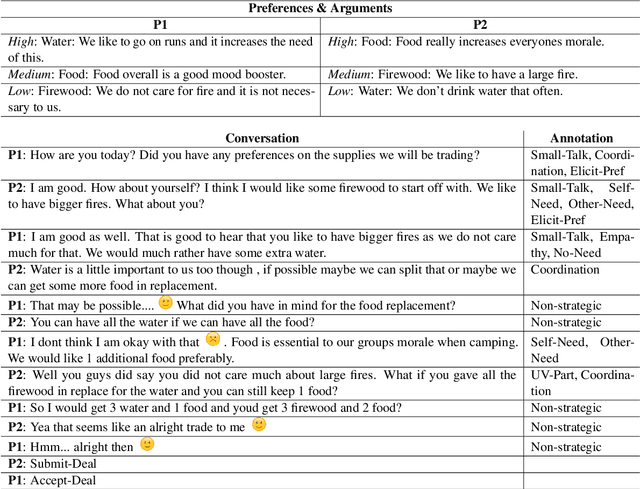
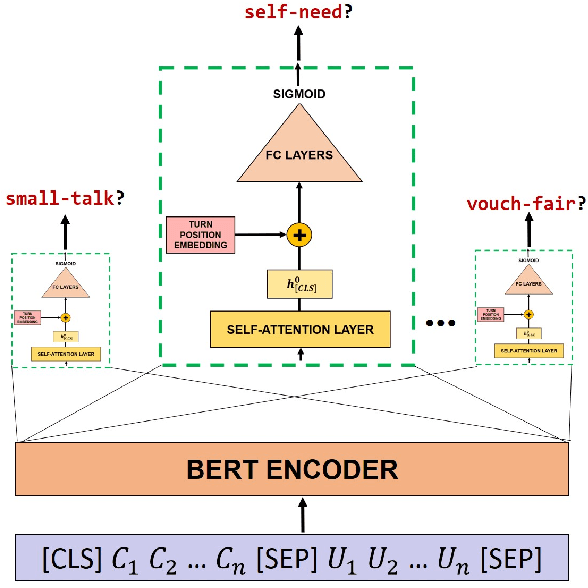
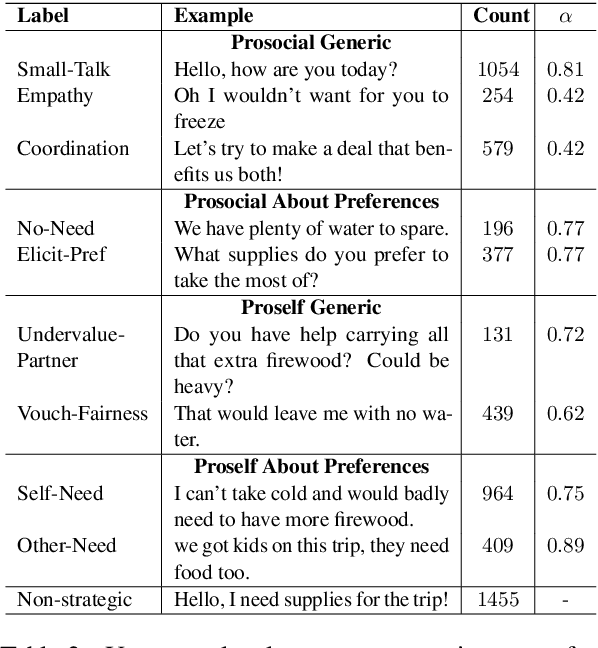
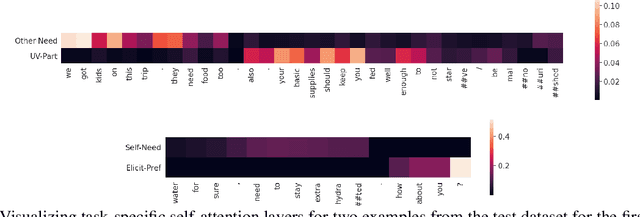
Abstract:Automated systems that negotiate with humans have broad applications in pedagogy and conversational AI. To advance the development of practical negotiation systems, we present CaSiNo: a novel corpus of over a thousand negotiation dialogues in English. Participants take the role of campsite neighbors and negotiate for food, water, and firewood packages for their upcoming trip. Our design results in diverse and linguistically rich negotiations while maintaining a tractable, closed-domain environment. Inspired by the literature in human-human negotiations, we annotate persuasion strategies and perform correlation analysis to understand how the dialogue behaviors are associated with the negotiation performance. We further propose and evaluate a multi-task framework to recognize these strategies in a given utterance. We find that multi-task learning substantially improves the performance for all strategy labels, especially for the ones that are the most skewed. We release the dataset, annotations, and the code to propel future work in human-machine negotiations: https://github.com/kushalchawla/CaSiNo
 Add to Chrome
Add to Chrome Add to Firefox
Add to Firefox Add to Edge
Add to Edge